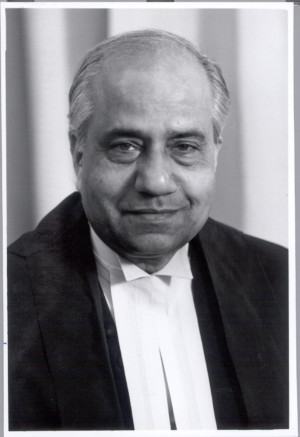By Paras Ramoutar
Port-of-Spain– Eminent Indian jurist B.N. Srikrishna has urged Trinidad and Tobago to fully adopt the Caribbean Court of Justice (CCJ) as its final court of appeal rather than the Privy Council in London.
“What are you waiting for,” asked Justice Srikrishna, a retired judge of the Supreme Court, at a symposium hosted by the Law Association of Trinidad and Tobago that was aimed at encouraging the government to suitably amend the Constitution to elevate the CCJ as the final court of appeal.
Noting that India had replaced the Privy Council as its final court of appeal by the Federal Court of India — now the Supreme Court of India — just two years after gaining independence from Britain in 1947, Justice Srikrishna asked: “Why should a sovereign state allow its former master to be the final arbitrator?”
For several years now, there have been strong calls for the government of Trinidad and Tobago to disqualify itself from the Privy Council. This, however, requires consensus in parliament, which is not forthcoming.

Justice Srikrishna, then a relatively junior judge of the Bombay High Court, had come into the limelight when a panel headed by him painsakingly probed the 1993 serial blasts that rocked the city.
On his retirement from the Supreme Court in 2006, he headed the Sixth Pay Commission that revised the salaries and allowances of government servants, headed the probe into the violent incidents in the Madras High Court in 2009 and chaired a committee that studied the feasibility of carving a separate state of Telangana from Andhra Pradesh.
Speaking at the event, Jamaica-born Judge Patrick Robinson, now a member of the International Court of Justice at The Hague, said: “Our colonial legacy has brainwashed us to believe we are not good. But the CCJ is as good as or better, and can fulfil all the needs of the region. The Privy Council must be weary of people from the Commonwealth.”
Justice Robinson said that the Caribbean people that should not doubt “the greatness of our region”.
“Why would anyone doubt that a region has produced Hugh Wooding, Norman Manley, Telford Georges, three Nobel laureates — Arthur Lewis for economics, Derek Walcott and Vidia Naipaul for literature; Elsa Goveia, CLR James, Bob Marley, Usain Bolt and Trinidad Carnival — why would anyone doubt that a region with such a tradition of culture and greatness could produce a final appellate body that meets at the highest international standards of competence, independence and impartiality,” he asked.
Judge Robinson said that the CCJ was efficient in determining matters before it, pointing out that of 192 matters filed, 180 of them had been disposed of within one year.
He noted its accessibility to Caribbean citizens, the majority of whom cannot afford the 5,000 mile trip to the Privy Council which is, “utilised by those who are relatively well off and those accused of murder who receive pro bono representation from English lawyers”.
The Jamaican continued that the best way to express sovereignty is through identity and self image.
“By far, the worst relic of enslavement, indentureship and colonialism is that they have left Caribbean people with a muddled sense of identity. We must not wait for others to liberate us from this complex. Marcus Garvey, a Pan African freedom fighter was right when he said, ‘None but ourselves can free our minds’.”
“If the Privy Council has served Trinidad and Tobago well, the CCJ will serve it better,” Judge Robinson quipped.
Out of a population of 1.3 million in the country, some 44 per cent are of East Indian extraction, whose forefathers were sourced from India (principally from what is now Uttar Pradesh and Bihar between 1845 and 1917) to work on enhancing the agricultural capacity of the then colonial country. (IANS)














